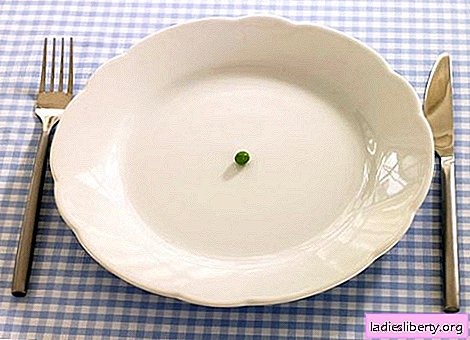
Starvation - Description and General Principles
Fasting refers to methods of stimulating the body's defenses. How did scientists come to think about the benefits of fasting? When the animal begins to hurt, it immediately stops eating. During severe stresses, a person also loses his appetite, even an aversion to food may automatically appear. This is how natural recovery processes manifest themselves. This is not a panacea for all diseases, but just one of the ways to have a powerful effect on the body. Moreover, it’s quite stressful, but allows you to achieve amazing results.
Before starting fasting, you should weigh the pros and cons, properly prepare the digestive system, the ability to use complex therapy to achieve the goal.
Thus, a large number of diseases of the internal organs can be cured. However, you should not consider this method as too simple, you must definitely take into account a lot of nuances. There are a lot of supporters of therapeutic fasting. The most famous of them, Paul Bragg, believes that it is undesirable to use the most extreme forms - prolonged dry fasting without water or without movement. Be sure to carry out a set of cleaning procedures.
The main stages of fasting
Unloading and dietary therapy consists of preparation and two main stages. To prepare for fasting, a complex of cleansing procedures is performed. At the first stage, fasting is carried out for three to five weeks. No food is used, no medicine is used. Only clean drinking water should be abundant. Mandatory daily routine, bathing and cleaning procedures.
In the second stage, the main goal is to restore in a special way. At first, vegetable and fruit juices are used, then vegetables are rubbed on a fine grater. Then cooked vegetables are prepared and served in the form of a special vinaigrette with herbs, nuts, cereals, kefir or sour-milk products. Recovery should last as long as starvation itself lasted, or even longer.
Psychological safety during fasting is a supporting factor
Complete and incomplete fasting have a fundamental difference. If food is still consumed, even the smallest volume, the body switches to internal nutrition. Due to the distortion of normal metabolism in the body, it can provoke dystrophy. Therapeutic fasting is fundamentally different. For most people, the feeling of hunger disappears completely, and starvation is easily tolerated.
Man is not threatened with exhaustion, in contrast to forced starvation in extreme conditions in which people fell. This is explained by the fact that additional procedures - baths, massages, walks in the fresh air help to cope with toxins. Psychologically safe attitude, the presence of doctors' control, which exclude complications, are of great supporting importance. If a person knows when he will start a full-fledged diet, the fear of starvation is practically eliminated.
Who is shown fasting?
In practice, it was proved that this method is productive in cases where patients have a risk of complications in the treatment with drugs, as well as overweight.
For therapeutic fasting, there may be indications in patients who are overweight and the following diseases:
- allergy (food and drug);
- skin diseases (eczema, psoriasis, urticaria);
- asthma is bronchial;
- the initial stages of atherosclerosis;
- obesity, and concomitant endocrine infertility;
metabolic disorders (osteochondrosis, osteoarthrosis, ankylosing spondylitis);
- liver cirrhosis and chronic hepatitis;
- pancreatitis, stoneless cholecystitis;
- hypertension of the I - II degree;
- coronary heart disease and the initial stages of atherosclerosis;
- chronic enteritis, colitis, diseases of the digestive system;
- neurosis and depression.
The effects of starvation on the body
The first procedure is cleansing. You can draw up a real scheme by which the body is cleansed. Under the slag understand the substances that accumulate in the body, but it does not need him at all. For example, waste cell processes, toxins. Initially, they enter the bloodstream, which is the main channel for their transfer in the body. The increase in toxins causes weakness, the well-being worsens. Blood is cleansed using the excretory system, which includes the kidneys, intestines, skin. Blood is cleansed, health improves.
Daily routine and additional procedures
To do this, you can use walks in the fresh air, physical education, marine procedures. The more oxygen the blood carries, the better the person's well-being. Massage, steam room and sauna contribute to well-being. In this case, excretory processes through the skin are activated. Massage and a bath should be used carefully, observing the general condition. You can also use an enema to prepare for fasting. You only need to be careful not to push the contents of the intestines inward. Among other ways to cleanse the intestines, laxatives are used - magnesia, special infusions of herbs.
Water
If the procedures do not give a tangible result, then for better cleansing the body, you can introduce Borjomi mineral water into the diet, which will slow the flow of toxins into the blood. But even one bottle (500 ml) can extend the duration of fasting. You can slow down the effect in cases where spring water contains many mineral components, for example, in the mountains. Part of the enema water also remains in the body, so you need to approach its choice carefully. But if you use rain or distilled water, the cleansing effect manifests itself much faster.
But in this case, you need to help the body with physical exercises and procedures that promote excretory processes (massage, bath, walks, sports exercises).
Fasting methods
Our article mainly describes the methods of A. Nikolaev. Classical and author's methods of fasting practically do not differ from each other in the early stages. All of them require preliminary purification and the participation of additional procedures - massage, self-massage, smoking cessation and alcohol consumption, sufficient motor activity.
P. Bragg's fasting method
Well-known method developer Paul Bragg practices one-day fasting followed by an increase in the number of days. One of the differences in his method is the denial of the benefits of enemas. The use of an enema, he considers an unjustified waste of intestinal strength. He himself used his methodology according to this principle: during the year he starved three times - one day, once every three months a week and three weeks once a year. He was also a vegetarian.
Method of fasting A. Brusnev
A. Brusnev believes that fasting can be carried out only in combination with the laws of the Respiration - this is the main difference between his methodology. Breathing, water, nutrition - the basis, the foundation of human life. Methods of purification should go in parallel with these laws. The first stage is two days. After two nights with an empty stomach, Brusnev recommends a regular lunch (no more than 300 ml).
The method of fasting G. Voitovich (cascade)
G.A. Voitovich believes that the treatment of severe patients with fasting should be carried out in several stages (cascades), in total a rather long period will be obtained. Cascading fasting is interspersed with cycles of restorative nutrition.
Contraindications fasting
Patients who are shown therapeutic fasting should be under vigilant medical supervision. Contraindications to starvation may occur during a preliminary medical examination. For fasting, there are relative and absolute contraindications.
Among the absolute, the following can be noted:
- tuberculosis (active stage), pulmonary and extrapulmonary tuberculosis in the active stage;
- rheumatism;
- insulin-dependent diabetes mellitus (and diabetes insipidus);
- adrenal insufficiency;
- gallstone disease of the II-III stage;
- stomach ulcer and 12 duodenal ulcer;
- chronic hepatitis, and cirrhosis;
- inflammatory processes associated with purulent formations, infections;
- heart failure, cardiac arrhythmias;
- thrombosis and thrombophlebitis.
Relative contraindications are determined upon examination by a doctor based on the current condition of the patient. Particular caution should be exercised if tissue implantation operations or other surgical interventions have been postponed in the past. Do not start fasting in a state of depression and psychomotor agitation, and other mental disorders, as well as with severe dystrophic manifestations.
Pros and Cons of Fasting
The luminaries who developed this method indicate that all processes should be carried out only under the strict supervision of physicians. The minus of starvation can be called the complexity of its implementation, especially at first, when the feeling of hunger torments. Irritability, sleep disturbances, exacerbation of chronic diseases may appear. Acidosis develops - a white coating forms on the tongue, a person exhales air with acetone.
Body weight ceases to decrease too much - only 200-300 grams per day. Prolonged fasting is fraught with exacerbation of the kidneys and edema is formed, the condition of the hair worsens. After 7-10 days, these phenomena disappear. Pros - classic and individual author's techniques treat a variety of diseases. Fasting effectively cleanses the body and is a prevention for the emergence of new diseases.
Starvation - useful tips and reviews
A paradox, but therapeutic fasting is also useful for stimulating appetite in people with low body weight. This can be a condition after an illness with eating disorders. This is explained by the fact that during fasting food centers normalize, and after getting out of fasting, food begins to assimilate much better than before fasting. During fasting, body weight may decrease slightly, but this is not considered a negative factor. It is necessary to conduct 2-3 unloading and dietary courses, about 10 days. Gaps must not be
less than 3-4 weeks.
Here are some tips given by the starving and their entourage to another author of the fasting method G. Shelton:
Use water procedures during fasting in limited quantities, observe cleanliness and hygiene. Bathing should not require a lot of energy, so it should be short. Water should be warm or cool, but not hot or cold. If the starving person feels weak, you can simply help him - wipe with a damp sponge. Do not neglect the sun baths, but you can not always be in the sun. This is not a medicine, but an integral part of the treatment.
Comments











